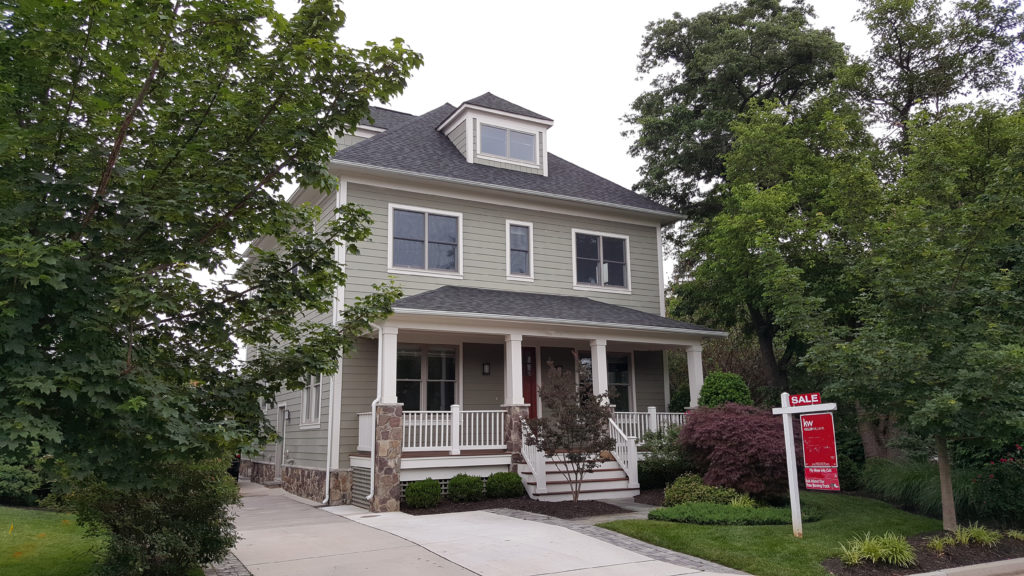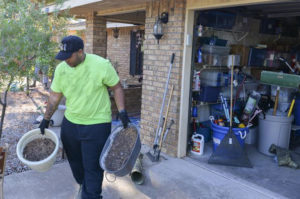People of all ages, income levels, geographic areas, and lifestyles are downsizing. Anyone who wants (or needs) to live a smaller, simpler or merely different life than the one they’re currently living can be a happy downsizer: Empty-nester Baby Boomers whose children have flown the coop; pre-retirement “re-invention” Baby Boomers who want to be free to roam the world; divorcing couples; people of any age whose companies have moved to urban environments; people who want walkable communities and bike trails; and everyone else who’s sick of taking care of so many rooms and so much stuff.

Baby Boomers Downsizing and Simplifying
The 55+ Demographic They’re better known as Baby Boomers (born between 1946 and 1964), and there are a whole lot of them: about 76 million, to be more precise. While they’re now outnumbered by Millennials* (also known as “Generation Y”), who number 83.1 million, some important facts about Baby Boomers** point toward a seismic shift in the residential real estate market over the next decade Baby Boomers control nearly 66% of the estimated $8 trillion in home equity. While the majority of baby boomers would prefer to “age in place” if they have total control, one-third of baby boomers expect … READ MORE about Baby Boomers Downsizing and Simplifying

Empty Nesters Love Downsizing!

When the baby birds leave the nest, what’s next?
To some people, it’s a rude awakening when they find themselves sitting at the dinner table alone or with a spouse: The children are gone, and it’s just too quiet. They long for the days when the noise and chaos of kids filled the house with life. They live for the day when the kids come home for Christmas, summer vacations or family celebrations. They may clean up their kids’ rooms but they leave them as they were, full of high school and college trophies on bookshelves and long-outgrown clothing in the drawers and closets. Of course, these parents move on and fill their days the best they can. They’re working, doing chores around the house, having friends over for dinner and traveling twice a year.
This type of empty-nester is determined to stay put — “for the kids!” or because “I don’t know where to start.” The kids are long gone and their return visits are few and far between, but these parents want the family home to remain as it was when the kids lived there. Chances are they’ll stay in the home until they move to assisted living, and the kids will be the ones to deal with the years of accumulated stuff and making repairs before putting the house on the market.
And there’s not a thing in the world wrong with that picture.
But many people can’t wait to be empty-nesters. They can’t wait to get out of the houses in which they raised their children. They relish the fact that they’re finally alone (as a couple or as a single parent) and feel a new sense of freedom and purpose. The kids are D-O-N-E and G-O-N-E. They raised the kids to the best of their abilities and the kids are happy and independent. As they hit their mid- to late-50s and their 60s, they know they have a lot of life left, and they don’t want to spend it taking care of a 5-bedroom house in the suburbs with rooms they never enter and tons of stuff they never use. Instead, they are all about reinvention. (INSERT internal link)
“The beauty of rediscovering the starting line.”
(INSERT facts/stats about “next act” gigs that 50- and 60-somethings are starting.
In late 2016, a Washington Post article about empty-nesters who’ve downsized described some of the challenges inherent in the process. One of the most vexing is the question of where to go. Some empty-nesters who plan to downsize into a single-family home know they need a one-level design because they plan to stay in the home for a long time and don’t want to navigate stairs as they get older. Others opt for a two-level home that can be modified later to suit their needs (say, with an elevator or chair lift), according to Realtor Billy Buck, of Buck & Associates in Arlington, Virginia.
Another challenge is the limited number of small single-family homes on the market in desirable neighborhoods. Finding the right condominium can also be frustrating. Demand is high and competition is tough: baby boomers and millennials are competing for the same properties.
And simply because people downsize to smaller homes doesn’t necessarily mean lower costs associated with the properties. While monthly expenses can be considerably lower in a smaller home, prices for the properties themselves can be the same as or higher than their larger homes. “It’s not necessarily a price decrease as much as a lifestyle change,” said Caryn Krooth Gardiner of Heller Coley Reed, a Long & Foster agency in Bethesda.
Downsizing is exhausting, but freeing.

Melanie Boutte and her husband Andy Williams downsized from a 3,500-square-foot home in Nashville to a 1,200-square-foot condo in Atlanta’s Buckhead neighborhood. “I’ve always been a bit of a minimalist and don’t like a lot of clutter, so I didn’t have to clean out tons of stuff from drawers and closets. But I was challenged to figure out what to do with all of our great furniture. I knew it wouldn’t all fit in the new place.” They sold their Nashville house quickly and had to store a lot of their furnishings as they renovated the place in Atlanta before moving in, which was a big headache. They had to sell or give away a lot of what they had in storage because, no surprise, it didn’t fit, even after having gotten rid of a lot of it in Nashville. When another move seemed imminent, after Andy accepted a job in D.C., Melanie said it was a breeze. “Another condo, another renovation,” said Melanie. This time, into a 1,350 square foot unit at The Watergate. “We’re both glad that we went through the process in our 50s. It was exhausting, but we’re so happy with our new lives.”
The Washington Post article provided a few downsizing tips:
- Figure out whether you’re going to sell your place first, or buy another place first. And consider renting if you can’t swing maintaining two properties at the same time.
- Decide if you need to be near public transportation.
- If you have a dream location in mind, be prepared to extend your “search zone” a few miles on every direction to find similar properties at more affordable prices.
- Consider hiring a downsizing professional, such as a professional organizer (check out Certified Professional Organizers by visiting the National Association of Professional Organizers website.
- If you’re interested in townhouses, find one that already has an elevator so you don’t have to add one later.
- If you’re interested in single-family houses, find one with the master bedroom and bathroom on the main level, and that has an entrance without stairs (from garage or driveway into kitchen, for example).
- If you’re “of a certain age and mindset,” consider active-adult communities that have houses, townhouses or apartments, such as Fox Hill Residences, Maplewood Park Place, Greenspring or Ashby Ponds. And for those looking to hit the “restart” button and head to a sunny locale or to the mountains, check out 55places.com for a list of its best communities.

"Reinventors"

People who hit middle age without having changed careers, moved to a new city, traveled the world or reinvented themselves have done themselves a disservice. As those who have experienced these life-changing events recognize, these “passages” may not be easy, but they are energizing, refreshing, freeing and, simply put, necessary.
Downsizing and decluttering have a similar effect on people, no matter their age. But it’s empty-nester baby boomers who have the most to gain from creating a “new world” — because they have approximately half of their working years yet to live. Without the baggage of a large home with rooms they rarely enter and closets full of life’s clutter, they are free to roam, more likely to start another career, able to sit on the porch without worrying about chores left undone, and more apt to visit their children and grandchildren.
In some ways, downsizing is reinvention. It’s following a different path, allowing a different pattern to unfold.
People who reinvent themselves do so for many reasons, just as people who downsize have different reasons and motivations. Some reinventions and downsizings are forced, some are optional. In his book Boomer Reinvention, author and Reinvention Coach John Tarnoff advises people 50 and older about how to reinvent themselves to prepare for a new career, one that will help ensure they have enough money to cover their expenses in retirement. (An estimated 60% of baby boomers have not saved enough for retirement.)
The advice he provides to baby boomers about how to prepare for career or workforce “reinvention” is spot-on applicable for how to people in all stages of their lives can prepare for downsizing and decluttering their homes.
- “It’s okay not to know what you’re going to do.” And it’s okay not to know where you are going to GO. The first and most important step in finding a new career or in downsizing your lifestyle is to make the decision that you’re open to new opportunities.
- “If you’ve always done it that way, it’s probably wrong.” This pearl of wisdom is from Charles Kettering, the first General Motors R&D executive, the gist of which is to get outside your comfort zone, be willing to be uncomfortable for a while. Same with downsizing! It’s not easy and it’s not quick, but the end game is worth the headaches.
- Be strategic. Assess your skills, interests and opportunities. Do a SWOT analysis (strengths, weaknesses, opportunities and threats). Get a sense of what the future looks like, but be realistic. You’re not likely to find the perfect, high-income career in record time, just as you’re not likely to quickly find the perfect new home that’s half the size of your existing home.
- Don’t make the same mistakes. Simply because you’ve been a chief financial officer all your life, don’t jump at the first CFO opportunity that comes along. It could be a disaster if you have a grueling commute, a new leadership team, or a new, unproven product to promote. Similarly, if you decide to downsize from the suburbs and move to an urban environment, don’t clutter up your new smaller place with your over-sized furniture from the old place and start jamming closets with linens and sets of china that are rarely, if ever, used.
In his recent blog post about how baby boomers should prepare for the reinvention process, he concludes:
“. . . in retrospect, you will be grateful for your willingness to make those changes, whether it involved learning a new set of skills, moving or downsizing your lifestyle or finding new ways to be useful or needed in your job. This may be your last chance to save your career, but if you get it right, you’ll have many fruitful years ahead to enjoy it.”
Next-Act Baby Boomers
Lorem ipsum dolor sit amet, consectetur adipiscing elit. Mauris tempus ac ex sit amet eleifend. Nunc euismod tincidunt diam, vel gravida dolor faucibus ut. Sed iaculis egestas arcu nec dapibus. Vestibulum malesuada sit amet dui ac semper. Phasellus non semper augue. Donec a nulla sed eros rhoncus aliquam. Nunc mollis nunc a nibh molestie pellentesque. Nam tristique lacinia libero vitae cursus. Vivamus vitae vulputate sapien. Nulla eget hendrerit sem.

Those Going Through Life-Changing Events

Financial woes, divorce, death of a spouse, an unplanned move at your employer’s request, health problems that make it impossible to stay in your current home, or other unforeseen events can mean you are forced to downsize. This is an even more unpleasant thought than those who elect to downsize. But forced downsizings can turn out to be even more enlivening and rewarding than ones that you choose to go through. Why?
You probably ask yourself, “How can I feel good about this type of situation?” You may not feel good about it now, but keep the “end game” in mind and know that you WILL feel good about it once it’s over.
We all have burdens to bear. Many of them are self-made (“I moved into a house that’s too large and the mortgage and maintenance costs are keeping me awake at night.”); others are out of our control (“My husband was diagnosed with Parkinson’s and I can no longer take care of him AND deal with household chores and maintenance.”).
No matter why the unplanned downsizing is happening, summon all the strength and courage and energy you have as soon as you know the situation is closing in on you. Put your house on the market or, if you’re renting, give your landlord adequate notice, even if you don’t know where you’re going. Start cleaning out closets and the garage. Try not to dwell on the reasons why you’re downsizing, and focus on the light at the end of the tunnel. Once you’re out of the tunnel, you’ll be lighter and leaner and in a better position to start living your new life.
